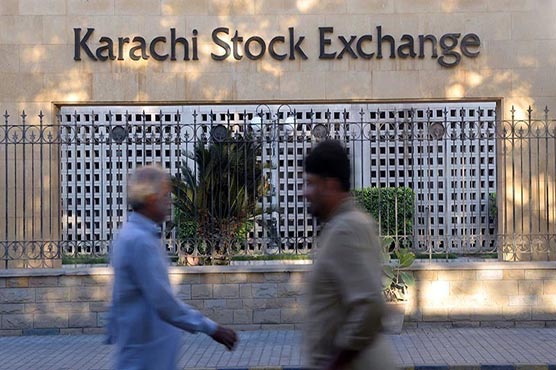A weekly review: Stocks obtain thin trade over coronavirus concerns

The KSE 100-Share Index obtained only 236.05 points on a weekly basis.
KARACHI (Dunya News) – The stock market in the outgoing week kept struggling for its sustainability as confusion and uncertainty surrounded potential investors due to the rout in global equities. Economists fret over sharper than expected downturn in world economies as the novel coronavirus outbreak continues to invade countries.
Other persisting factors, including the suspension of imports from China and adverse affects on the Asian economy have restricted the stock market to grow. Investors this week continued to dump stocks and plough their money in safe haven assets, mainly gold.
Altogether, the Pakistan Stock Exchange’s (PSX) benchmark KSE 100-Share Index obtained only 236.05 points on a weekly basis as last Friday the Index closed at 37,983.62 as compared to yesterday’s 38,219.67.
On Friday, the Index tumbled 1,162.44 points (2.95 percent) while wiping out Rs186 billion from paper value of corporate Pakistan. Foreigners in Pakistan capital market continued to sell off scrips valued at $2.29 million, taking the one-month outflow to a staggering $60m.
On Thursday, the PSX observed bullish trend and closed at 39,382.11 with a positive change of 475.71 points (1.22%).
On Wednesday, the stock market dropped 293.28 points and reached 38,906.40.
On Tuesday, the KSE-100 Index lost 96.62 points and settled at 39,199.68. A total of 225,275,610 shares were traded whereas the value of shares traded during the day stood at Rs8.763 billion.
On Monday, stocks rebounded with the Index jumping 1,312.68 points or 3.34 percent. The value of shares rose by Rs190 billion which is a gigantic leap in shares’ value in one day after May 2019. At close on Monday, the index settled in the green at 39,296.30.
On the first trading day of the week, the momentum was generated in the market as investors continued to relish windfall gains to the economy in the form of declining oil prices; squeeze in trade deficit by 27pc during 8MFY20 and lower-than-expected inflation numbers for February over the earlier month, raising hopes of an early cut in interest rates by the State Bank of Pakistan (SBP).
The positive change was also supported by the decline in certain inflation rates and positive effects of the Afghan peace deal in the region.
In the local market, the two heavyweight oil and gas exploration scrips – Oil and Gas Development Company and Pakistan Petroleum – were seen closing near their lower circuit breakers.
According to experts, the stock market has been searching for a proper direction for healthy growth but several factors continue to dominate the sentiments of potential investors.
Global markets extend slump
Stocks in the energy sector dropped as global oil prices slid to the lowest level since June, 2017. The international oil cartel, Organisation of Petroleum Exporting Countries (OPEC), was reported to be mulling supply cut to world markets by 1.5m barrels a day which was subject to the consent of main ally Russia.
Gold rose to its highest since January 2013 at $1,689.65 an ounce earlier in the session but later pared some gains. For the week spot gold prices rose about 5.6%.
Airline and travel stocks have been among the worst affected as people canceled non-essential travel.
The number of people infected with the new coronavirus across the world surpassed 100,000 on Friday as its economic toll intensified, with business districts beginning to empty and companies bracing for slower sales.
Stock prices have been impacted but how much and for how long earnings will be affected is unknown, said Katie Nixon, chief investment officer at Northern Trust Wealth Management in Chicago.
“We just don’t know the magnitude of the duration,” she said. Supply issues already are being resolved in China, but “the demand picture is a lot murkier as people are very rapidly changing their behavior around the world,” she said.
In Europe, the pan-regional STOXX 600 index fell 3.67%. Oil and gas stocks .SXEP ended more than 5% lower in their worst day in more than three years after Russia rejected a steep output cut from the Organization of the Petroleum Exporting Countries. The drop in Treasury yields weighed on shares of U.S. financial companies .SPSY, which tumbled 3.3% while the S&P 500 Banks index .SPXBK dropped 4.7%.
The three major Wall Street indices fell as much as 4%, but pared a good portion of those losses before the close.
Futures traders bet the Federal Reserve will slash U.S. interest rates to near zero by April.
Treasury prices soared but the strong U.S. non-farm payrolls report lifted the yield a bit from their lows.
Benchmark 10-year notes US10YT=RR rose 42/32 in price to yield 0.7923%, while the 30-year bond US30YT=RR rose 212/32 in price to yield 1.3167%.
Germany’s benchmark 10-year Bund DE10YT=TWEB yield touched a record low of 0.746.
The slide in Treasuries wiped out the yield advantage that had fueled a popular “carry” trade in currencies - borrowing at negative rates in the euro and yen to buy U.S. assets.
Oil prices tanked about 10% to their lowest levels since mid-2017. Brent LCOc1 futures settled down $4.72 at $45.27 a barrel, while U.S. West Texas Intermediate (WTI) crude CLc1 shred $4.62 a barrel to settle at $41.28 a barrel.
U.S. gold futures GCcv1 settled 0.3% higher at $1,672.40.
Global stocks tumbled and oil prices collapsed as investors panicked over the expected damage of the coronavirus to global economic growth.
Haven investments gold and the yen surged as the World Health Organization (WHO) warned that the epidemic must be taken seriously.
At the close of trade, the Paris stock market was down by 4.1 percent, Frankfurt dived 3.4 percent, London shed 3.5 percent and Milan tumbled 3.7 percent in a fierce global markets selloff that began about two weeks ago.
Wall Street stocks also suffered another bruising session, with petroleum producers and banks especially hard-hit, as the S&P 500 ended down 1.7 percent.

